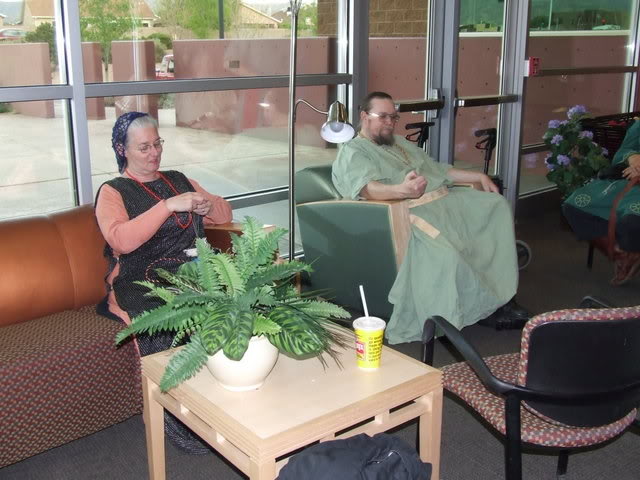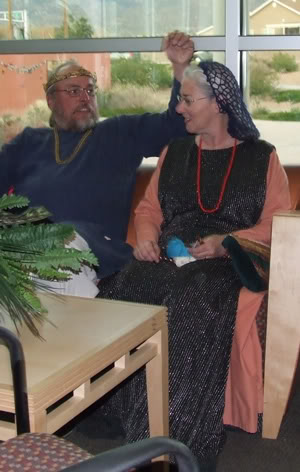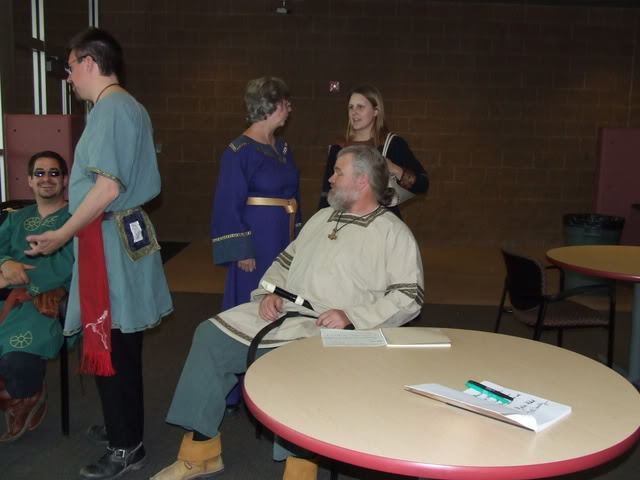Meet People and Learn Things
and Training and Command Techniques used to build an army
Koris Natterhelm, March 29 and April 26, 2007

How the Outlands Became the Outlands Army:
Burro Creek started being kinda barbarian by first Estrella, needed to have scenarios.
At the time of us learning basic tactics, Caid was the most organized. One of our tenets was that each group got to do once what they wanted to do.
Tried to make the Principality Warlord also a teacher, but travel made it hard.
Diversifying army with detachable units. "Game Films" from Burro Creek informed those and other decisions, e.g. action and reaction. Newcomers benefited from this experience immediately. Field commanders could have been anyone who took charge based on the situation. Formed small units with "jobs," able to execute smaller objectives on the battlefield and participate in melee practices.
Three years into Estrella, still working on trust in commanders.
Seemingly always outnumbered. The various Outlands units started to work together. Caerthe took a while to work together by itself.
Units swelled by word of mouth.
Lower elevation at Estrella was advantageous to Outlanders.
1987-95 Outlands would fight with Aten or Caidans.
Artemesia learned from Outlands' army, who tended to plan all wars for both armies.
1990-drills 1992-packets in mail to Outlands units with war instructions.
With many allied armies together, politeness becomes important. Many kings, all concerned about honor.
Fighters would need to be patient during breaks.
Sometimes plans would come together perfectly, further cementing the troops.
The first organized waterbearers came from the Outlands Other kingdoms followed. Gathering info using waterbearers, targeting officers, feints, attacking flanks, rear and reserves. [Duchess Leah Kasmira possibly disputes that, saying she got the idea for waterbearers from Duchess Willow, who had done or learned it at Gulf Wars, or something in that area. I don't know how organized what Willow reported had been. —ælflaED]
68 seconds, volcano war in Arizona
"Army of Heroes"
Pride at being the best army in the Known World never turned to arrogance.
Various units, division and combination, dissemination of plans: aided Outlands cohesion.
Rapier fighters became more prevalent.

Training and Command Techniques used to build an army:
Even in the old days, 25 or 30 years ago, people in al-Barran and the southern Outlands preferred melees to single combat. When you have a base group of people who like a think it makes it fun, so melee was fun here.
In any given year, in September, you can go out and look, at practices. Guys are overweight, armor's needing work, weapons and shields are beat to hell and they've forgotten what they learned the year before.
They'll do what you ask, but don't ask too much. They'll need enough air, stamina and energy. You could go zip to war in a month, but people will get hurt—twist shoulders, blow out a bicep...
Start September or October, at the latest. Start with long-winded melees. An hour, run around. They'll pick stuff up; don't try to teach them anything. Spot who's taking command on the field. Could be a new guy or an old guy. Who are they listening to, looking to? There's a third of your work done for you.
When you're out there, it's an ego-charger, when people are slapping you on the back because they're winning. It wasn't hard to get people to cooperate, ten years ago.
It took a long time for the war council to form itself. Earlier it was just the Crown, the general (often Koris) and the local commanders. People are pulled into the command track even before they're belted fighters.
Reserve units... small units.
Used to be there was Thunder, Haroun's guys, Bengals, Crimson—reserve units training together. You could send them in and call them back. It's a difficult maneuver, to get a group to come back out of a battle.
The Outlands tries to find out what various units WANT to do, tried to make sure they got to do that at least once during the war, sometimes two of three times. It gives troops confidence n their commanders, to get to be part of that preference. It bolsters their faith and confidence.
If the troops no longer believe the commander knows what he's doing, it's the hardest thing. They'll go do what they want to.
The Outlands was accustomed to being outnumbered, so counted on agility and knowledge of who could do what, who the commanders where, what the commanders were—generally training everyone who would listen. We tried to foster an environment to help new people learn how and why. The trick was answering in depth.
We could refer them to a marshal, baron, commander, knight who could coach, advise and analyze. [Anyone was free to learn as much as he wanted about how and why.]
There was a time we could get a guy in armor and all in six weeks. Can't do that now. [Karl is a recent exception; not stated in the full meeting. Koris meant it's not as common now, I think. —ælflaED]
 Years ago it was easier to do melee practice.
Years ago it was easier to do melee practice.
The Outlands army was and is one of the tightest armies in the Known World. Reputation in 25 years as an army is such that everybody wants a piece of it. They'll get the first charge and are crucial. The tradition of victory is such that people tend to brag about the achievements of the army units and other individuals, but not themselves. It's fun to hear people you've trained talk about it when they don't know you're hearing them. You get decent feedback when you overhear them casually. If you ask directly, they'll tell you what's wrong, but the first conversations are the success stories.
"Flying W" maneuver. Koris conceived it and set it out and got killed. It didn't make sense to enough people, others didn't move.
Back to September...
Order rattan.
get armor for people
see who's in good condition
see who has a command voice and who doesn't. A commander needs to be heard 50 yards away in a helmet, clearly. Better yet, 300 yards. If they can hear you, they'll come.
The Outlands army was trained to one voice, and that was an advantage then. Then there was the echoing—hear a command and pass it on.
In October:
Set up mismatched melees—20 to 11 guys. The eleven get pummelled, but they find out what armor needs to be reinforced or added, whether they need new boots, cup, kneepads. From staring to get pushed in practice, units form up.
It's satisfying to be able to tell a unit commmander "go get that flag"—they succeed, or they fail gloriously.
The more camaraderie, the better the war, the better the experience.
The Outlands was quick and fast, and had to learn then that they weren't invulnerable.
In the late 80's, Koris went to a September fighter practice in Phoenix, various groups combined they had 200 people at fighter practice. He talked to Ivan, Trelon and Brion and said "What's going on? You should be able to take the field and walk over anybody." It seemed to Koris though that in Atenveldt if you didn't have at least a belt, your voice would not be heard. If you weren't a baron, viscount or count, your voice would not be heard.
In some places, people who had told people what to do before wanted to keep doing it, but in the Outlands it was always more fun to tell people what (and how) to do, see the lightbulb go off over their heads, and watch them go do it!
Here, if the commander gets nailed someone else takes over because so many people understand the tactics and plans.
Outlands fighters have been seen many times to take command of groups from other kingdoms—even our unbelted fighters. Other kings have wanted Outlands units. Outlanders are well trained, quick and will fall down when they're dead. They do the best they can with whatever army they're with.
By the end of October, armor and weapons are in pretty good shape. Once people are forming up into units, then start showing them drills. If you watch them you can tell when they're starting to get ticked off about doing the same drill again. The drills are designed to take advantage of the known weaknesses of armies we've fought in the past.
The wonderful thing about the Outlands army is that everyone knows that—tactics are shared.
The Outlands has fostered and identity of unity at the war, but commanders will let their guys try stuff.
One of the hardest things to learn is how to train a guy—figure out why and how he's doing what he's doing and see how you can help him. Give him opportunities to fight lots of different body styles. Koris said "I hate to fight. I'd much rather command." [...always interested in tactics...] Sometimes the Outlands army had to be split between two sides to even out numbers, and once Koris got to go to the Caid strategy meeting and then the Aten strategy meeting.
November:
Running—set teams farther apart, run to engage. Remind them it will make it easier at the war.
December:
Pressure drills
Shield walls
Knock guys down. It's miserable, but once you've got it down, when you go to the war it's so much less than at pressure drill.
They learn how to deal with spears, working with partners. "Bare is the back without brother." They need confidence in their partners and teams. Practice with three-man teams, two with sword and shield, one with a spear or halberd.
Practice safe zones for pole arms. If the spear guy's good he can pull shieldmen out of the opposing line for his own shieldmen to kill.
Another advantage: Commanders of various units were relatively stable for long periods of time. Units knew what other units were capable of doing so they knew where they needed to be in order to take advantage of other groups' strengths.
In October, commanders and the generals would go to Aten coronation, and find out who was commanding, what the scenarios might be, even before treaty negotiations. Sent plans to allies, let them recommend changes and after a few years they learned that the Outlands will make good use of their troops and won't screw them over.
By December, by Midwinter, you can hand out plans for the war, and the army knows what they need to do to train.
January:
Helps to know which units are column charge units, which is good and scary.
If they move together, dressed alike and respond to command, even if they're new it will be intimidating.
When the army's dressed alike, it means the women are involved, which means the troops are happier. You don't want to see that in the enemy, we want to see that in US.
Go to practices after al-Barran Midwinter, Caerthen Twelfth Night, Citadel's Twelfth Night, Candlemas, Golias war practice. You can take your men and show them off, and they're tickled pink when it works. St. Golias has a big resurrection battle. You can tell by then who can and who wants to do what.
The more confidence you can give them that there's a plan, commanders know that you won't waste them, that it will work, the better for the fighters.
Early wars, after the first fight the five or six man command staff would grab a bottle and go out to the various units and tell them they did a great job and you were glad to command them. Go to the allies also. If a unit really distinguished themselves, go in, slap backs, recount what you saw, and the next day they're good for three- or four-to-one. Convince them they can do five-to-one.
We've let flanking units get in even if it might lose the battle or the war. You shift reserves there just in case, but groups get to do what they wanted to do.
The week before, people are afraid to get hurt. In February, you do the last little polish, armor is patched and prettied, work on vehicles and camping equipment, see who needs help and help guys get to the war. It might be hard for a man to say, "I need help to get to the war."
For a while, we were doing war bonds, guys would give $5 to the reeve when they could, and it could be cashed out later. Nowadays there's the poor fighter's fund. Lots are students or poor. They spent all their money getting their armor together, so help them out.
Make sure waterbearers have what they want. Help make it easy for them, helping them deal with officers or whatever. Smooth their path.
Make sure you have extra duct tape, parts, extra rattan, extra hose clamps, tools, nut drivers.
Armor repair stations were an early improvement (sometimes the Outlands gets credit for that).
Also in February, get a count of who'll be there. Check with allies, and they'll start naming names and you'll start to know how many various guys can bring.
Koris would prefer to lose than to split the army, but sometimes it was split. For a long time, whoever the Outlands fought with won.
Once you have the plan and know who will be where (behind, which side, ahead), begin a dialog (mail, phone, at events) to discuss the objectives. "What are you gonna do, you gonna take off like a scalded dog, or what?"
Try to have unit designations on the plan diagrams of battles.
Gunwaldt recommends barons discuss what they have and can do and present the general with these chess pieces he can use (Fontaine, al-Barran, Citadel).
It's after Pennsic and after tourney season.
The dynamics of the fight change when two groups combine.
Brennain adds that too much command gets old. People can take September to February, but they'd get sick of it if it were year round.
The plan was understood but it was difficult to translate the plans to the people...
Koris said he would've gone to smaller unit commanders and let them know the general plan, but tell them to look to the baron when the time comes.
In more informal discussion while we were cleaning up, Koris said when they identified potential commanders, years back, they'd have tactics classes with miniatures.
Notes by Master Balthazar Tegero and Karl of Gulbjorn, transcribed by AElflaed (notes on second talk by AElflaed, and photos).
Those present in March: Koris,
Leah,
Karl,
Odile,
Balthazar,
Meredith,
Jacob,
Brennainn,
William,
Avram and
Beatrice.
In April: Koris, Leah, Gregor, Gunwaldt, AElflaed, Balthazar, Odile, Breannain, Jayne, Lucia and Jim.
Ælflæd was sick and is grateful to those who carried on in her absence on March 29, especially Balthazar and Karl